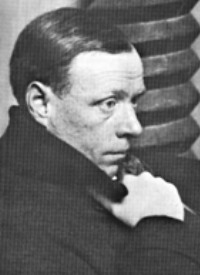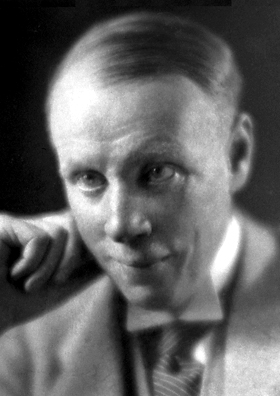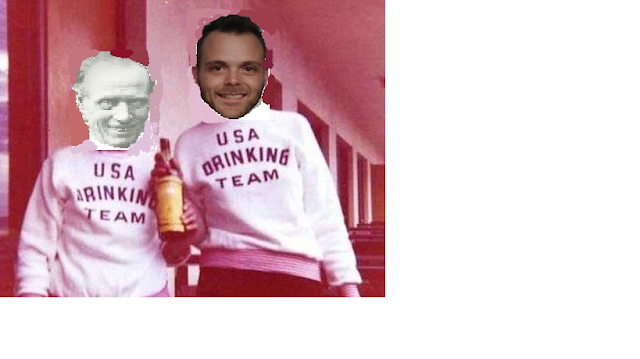

"I, being a revolutionist, know exactly what I want -- and what I want now is a drink.”
- Sinclair Lewis, Babbitt
Red Headed Step Child? He Didn't Think So.

Harry Sinclair Lewis was born in Sauk Centre, Minnesota to a country doctor. His biological mother passed when he was 6, and his father remarried the woman he would consider his mother. His small town upbringing in Sauk Centre would later be his inspiration for his novel Main Street.
Tales From the Cryptkeeper?
As a child, young Lewis was teased by his classmates. His bright red hair and his bad skin made his scholastic life miserable and isolated him from many of his peers. At the age of 13 the teasing became so unbearable that he even attempted to escape and join the Army as a drummer in the Spanish-American War, but his father caught him and brought him back home. Unfortunately, it seems that this appearance followed him into adulthood.


The resemblance is uncanny!
Lewis took refuge in reading and writing, however. As a young boy he engrossed himself in his father's medical books, which would later assist him in his novel Arrowsmith. Additionally, he kept a diary where he produced mostly romantic poetry.
I'm So Sad and Lonely, Nobody Cares for Me...
At the ago of 17 Lewis moved to Yale University to write for the Yale Literary Magazine. Despite being published in the Yale Literary Journal he was still very far removed from his peers at Yale. After summer vacations spent in England he left Yale his senior year and worked in fellow writer and journalist Upton Sinclair's commune as a janitor and also attempted to work building the panama canal. Both attempts were fruitless. Soon, he returned to Yale and graduated in 1908.
On the Road Again
From 1908-1915 Sinclair traveled from to California in search of work. Oftentimes, he would sell his story plots to other writers. During this time he met Jack London, and sold him the plot for what would later become The Assasination Bureau, Ltd. which wouldn't be completed until 1963. During this time Lewis also had his story Our Mr. Wrenn as well as five other novels published under a psuedonym, had a short story published in the Saturday Evening Post and married Grace Heggar, an editor for Vogue.
I Want to Be a Millionaire So... Bad
After settling down in Long Island with his wife, Lewis had the knock of fortune that led him to notoriety - Main Street. After the publication of Main Street in 1920 Lewis never had to worry about finances again. The success of Main Street led Lewis to become a full time writer, creating a new "hit" every few years.
Lewis was known for his social criticism and satirical style in his novels. His views on American society were often critical, and many of his books contained strong female characters.
Main Street (1920)- The study of hypocrisy and rigidity of small town life, Lewis wanted to portray the negative side of many towns in America. Based on his hometown, many Americans felt they could identify and that the novel exposed many of the problems American society was facing at the time.
 Babbitt (1922) - Dealt with conformity and the materialism consuming the middle class. Lewis called Babbitt "everything he hated about the middle class society".
Babbitt (1922) - Dealt with conformity and the materialism consuming the middle class. Lewis called Babbitt "everything he hated about the middle class society". Arrowsmith (1925) - Was one of the first novels to deal with science and the ethics involved in medicine.
Arrowsmith (1925) - Was one of the first novels to deal with science and the ethics involved in medicine.  Elmer Gantry (1927) - Perhaps the most controversial novel Lewis authored, Elmer Gantry told the story of a hypocritical, power hungry evangelical preacher. It reflected many of the fears and beliefs of the American society concerning the evangelical movement of the time.
Elmer Gantry (1927) - Perhaps the most controversial novel Lewis authored, Elmer Gantry told the story of a hypocritical, power hungry evangelical preacher. It reflected many of the fears and beliefs of the American society concerning the evangelical movement of the time. I've Smoked All of My Friends Down to the Filter
During his most successful years, Lewis was traveling and writing. In 1925 Lewis divorced Grace Heggar and married a newspaper correspondent named Dorothy Thompson. At this time Lewis was dinking heavily and had managed to alienate nearly all of his friends. * In 1930 Lewis and Thompson traveled to Stockholm to accept the Nobel Peace Prize. He was awarded the prize not for a single novel, but for his body of work. Lewis was the first American to be honored. His controversial acceptance speech has been reprinted many times since.
Big mistake, brother.
*results not typical
My Words Are Like A Dagger With A Jagged Edge
Excerpt from his acceptance speech titled "The American Fear of Literature":
"I have for myself no conceivable complaint to make, and yet for American literature in general, and its standing in a country where industrialism and finance and science flourish and the only arts that are vital and respected are architecture and the film, I have a considerable complaint. [...] [I]n America most of us - not readers alone but even writers - are still afraid of any literature which is not a glorification of everything American, a glorification of our faults as well as our virtues. To be not only a best seller in America but to be really beloved, a novelist must assert that all American men are tall, handsome, rich, honest, and powerful at golf; that all country towns are filled with neighbors who do nothing from day to day save go about being kind to one another; that although American girls may be wild, they change always into perfect wives and mothers; and that, geographically, America is composed solely of New York, which is inhabited entirely by millionaires; of the West, which keeps unchanged all the boisterous heroism of 1870; and of the South, where everyone lives on a plantation perpetually glossy with moonlight and scented with magnolias." (tcm.com)
Yesterday, All My Troubles Seemed So Far Away
The 1920s was the most successful period for Lewis. Beyond the 1920s, although he continued writing, he never reached the success levels of his previous novels. He spent a considerable amount of time working on plays, lesser celebrated novels and short stories. Occasionally, he even acted in some of his plays. The income he received from his books allowed him to continue to live the way he had before, traveling, the finest hotels and many luxuries. Unfortunately, his alcoholism continued to take it's toll.
I Drink, I Smoke, I'm Supposed to Quit, But I Won't
In 1937 Lewis checked in to a sanitarium to be treated for alcoholism. The doctors explained to him that he was going to "live without alcohol or die by it". Lewis decided to check out after 10 days. His doctor documented that he had "no understanding of his problem" (kirjasto.sci.fi).
Lewis spent the 1940s in Hollywood. He was contracted by MGM to work on a script for a western called Storm in the West. Initially, Lewis was excited but later became disenfranchised with the filmmaking process due to censorship and restriction placed on him by the film industry. Lewis stated, "What really bothers me is not the fact that, say, a couple gunmen couldn't say anything so vile as 'damn', but that all really stirring issues, political, racial, biological, must be sidestepped or not even approached" (tcm.com).
In 1942 he divorced his wife, Dorothy Thompson.
In 1944 his son with Grace Heggar, Wells Lewis (named for H.G Wells), was killed in World War II in combat in France.
Homeward Bound
Lewis spent the remainder of his life in Europe. He began to feel the effects of his advanced alcoholism that worsened his skin condition and shortened his temper. Consequently, his lack of friends, also said to be an effect of his alcoholism, reduced him to hiring secretaries to play chess with him. He died in Rome on January 10th, 1951. The official cause was paralysis of the heart, said to be related to his extremely advanced alcoholism.
Other Facts:
- After hearing that Lewis had won the Nobel Prize, Hemmingway said that it should have gone to James Joyce or Ezra Pound.
- While neighboring towns of Sauk Centre banned Main Street, Sauk Centre supported him, and even today the high school teams are known as the MainStreeters.
- In 1930, Lewis and Dorothy Thompson had a child, Michael. He became an actor, was also an alcoholic, and died of Hodgkin's Lymphoma.
- Fitzgerald initially praised Arrowsmith extensively, but later stated that he felt that The Great Gatsby was a superior novel.
- He was awarded the Pulitzer Prize for Arrowsmith, but declined it.
- While studying for Elmer Gantry, Lewis went to the pulpit and for fifteen minutes challenged God to strike him down to prove His existence.
Works:
Drama
Jayhawker: A Play in Three Acts, pr. 1934 (with Lloyd Lewis)
Jayhawker: A Play in Three Acts, pr. 1934 (with Lloyd Lewis)
Long Fiction
Our Mr. Wrenn: The Romantic Adventures of a Gentle Man, 1914
The Trail of the Hawk: A Comedy of the Seriousness of Life, 1915
The Innocents: A Story for Lovers, 1917
The Job: An American Novel, 1917
Free Air, 1919
Main Street: The Story of Carol Kennicott, 1920
Babbitt, 1922
Arrowsmith, 1925
Mantrap, 1926
Elmer Gantry, 1927
The Man Who Knew Coolidge: Being the Soul of Lowell Schmaltz, Constructive and Nordic Citizen, 1928
Dodsworth, 1929
Ann Vickers, 1933
Work of Art, 1934
It Can’t Happen Here, 1935
The Prodigal Parents, 1938
Bethel Merriday, 1940
Gideon Planish, 1943
Cass Timberlane: A Novel of Husbands and Wives, 1945
Kingsblood Royal, 1947
The God-Seeker, 1949
World So Wide, 1951
Our Mr. Wrenn: The Romantic Adventures of a Gentle Man, 1914
The Trail of the Hawk: A Comedy of the Seriousness of Life, 1915
The Innocents: A Story for Lovers, 1917
The Job: An American Novel, 1917
Free Air, 1919
Main Street: The Story of Carol Kennicott, 1920
Babbitt, 1922
Arrowsmith, 1925
Mantrap, 1926
Elmer Gantry, 1927
The Man Who Knew Coolidge: Being the Soul of Lowell Schmaltz, Constructive and Nordic Citizen, 1928
Dodsworth, 1929
Ann Vickers, 1933
Work of Art, 1934
It Can’t Happen Here, 1935
The Prodigal Parents, 1938
Bethel Merriday, 1940
Gideon Planish, 1943
Cass Timberlane: A Novel of Husbands and Wives, 1945
Kingsblood Royal, 1947
The God-Seeker, 1949
World So Wide, 1951
Nonfiction
From Main Street to Stockholm: Letters ofSinclair Lewis , 1919-1930, 1952 (Harrison Smith, editor)
The Man from Main Street: Selected Essays and Other Writings, 1904-1950, 1953 (Harry E. Maule and Melville H. Crane, editors)
Minnesota Diary, 1942-1946, 2000 (George Killough, editor)
From Main Street to Stockholm: Letters of
The Man from Main Street: Selected Essays and Other Writings, 1904-1950, 1953 (Harry E. Maule and Melville H. Crane, editors)
Minnesota Diary, 1942-1946, 2000 (George Killough, editor)
Short Fiction
Selected Short Stories ofSinclair Lewis , 1935
If I Were Boss: The Early Business Stories ofSinclair Lewis , 1997 (Anthony Di Renzo, editor)
Go East, Young Man:Sinclair Lewis on Class in America, 2005 (Sally E. Parry, editor)
The Minnesota Stories ofSinclair Lewis , 2005 (Parry, editor)
The Short Stories ofSinclair Lewis , 1904-1949, 2007 (7 volumes; Samuel J. Rogal, editor)
Selected Short Stories of
If I Were Boss: The Early Business Stories of
Go East, Young Man:
The Minnesota Stories of
The Short Stories of
All Good Things
The obituary written and published in Time said, "He was not a great writer, nor even a very good one; but he hit the U.S. hard in its solar plexus, immortalized a national character, and added several household words to the American language. [...] His great merit was that he gave the U.S. and the world a sense of the enduring strength (ugly or not) of Main Street; and that he made Americans on all main streets, including Babbitt, stop hustling long enough to wonder uneasily where they were going."
We're In It To Win It
Works Cited
Books and Writers
Katona, Anne, Sinclair Lewis
Sinclair Lewis Society
Turner Classic Movies
Vidal, Gore The Romance of Lewis Sinclair
http://www.nybooks.com/articles/archives/1992/oct/08/the-romance-of-sinclair-lewis/
http://www.nybooks.com/articles/archives/1992/oct/08/the-romance-of-sinclair-lewis/






there is a little spelling error at the section titled "I'm So Sad and Lonely, Nobody Cares for Me..."
ReplyDelete